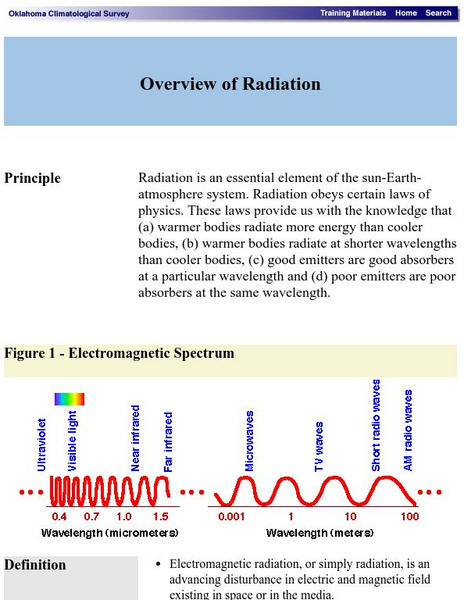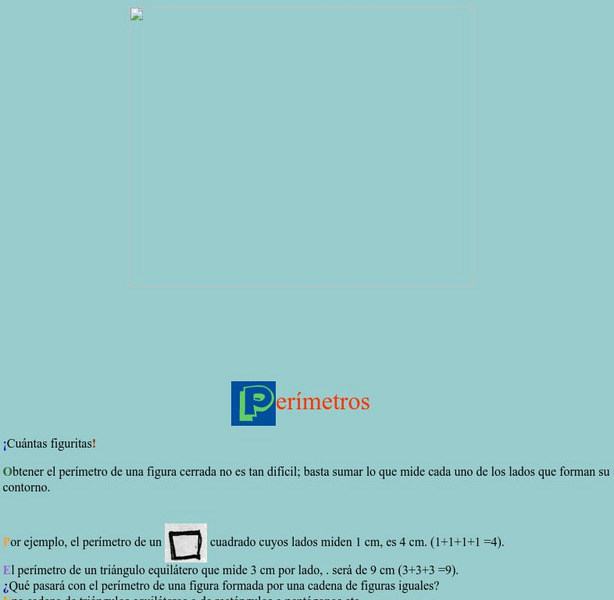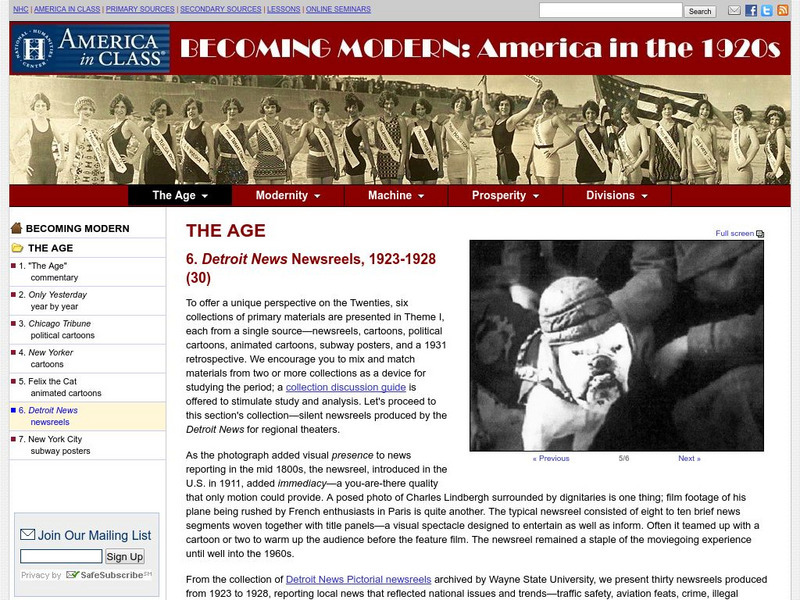Georgia State University
Georgia State University: Hyper Physics: Mirrors in Imaging
A discussion from Georgia State University of different types of mirrors and the images which they create. Discusses different instruments which use mirrors to produce images.
Oklahoma Mesonet
Oklahoma Climatological Survey: Overview of Radiation
This site details what radiation is, the physics of radiation, and radiative transfer as it occurs in nature. Content explores the electromagnetic spectrum, electromagnetic waves, properties of radiation, and solar radiation.
Exploratorium
Exploratorium: Science Snacks: Water Sphere Lens
Demonstrate for students how a round bowl of water can act as both a magnifier and a lens.
Optical Society
Optical Society of America: Optics for Kids: Blue Sky Red Sunset
An experiment where light is shone through a bottle of water, and then milk added, to see how this affects the path the light takes (with links to articles on reflection and refraction that explain what is happening).
Other
United States Master Swimming: Fiber Aquatics
The principle of total internal reflection is discussed in this article. The appearance of objects from inside the water of a swimming pool is compared to the path of light in a fiber optic cable.
Ministry of Education and Employment of Spain
Red Escolar: Perimetros
In Spanish. This site has a simple explanation on how to find the perimeter of a plane figure. It also contains an activity of following the path of a light and a brief biography of Oenopides de Chios.
York University
The Joy of Visual Perception: Physics of Visual Stimulus
From an online "book," this particular page describes physics principles related to vision and sight. Keywords are linked to other pages with further information. The role of sunglasses in blocking glare is discussed and explained. A...
Synopsys
Synopsys: A Gentle Intro to Optical Design: Why Is the Sky Blue?
Discusses Rayleigh scattering in plain language and attributes the blueness of the skies to this phenomenon. Discussion of scattering is just one topic of many on this lengthy page of optical topics.
University of St. Andrews (UK)
University of St. Andrews: Augustin Fresnel
A short biographical sketch on the life and work of Augustin Fresnel (1788-1827). Comments on a few of his scientific accomplishments.
TeachEngineering
Teach Engineering: Materials Properties Make a Difference
Students investigate the materials properties-such as acoustical absorptivity, light reflectivity, thermal conductivity, hardness, and water resistancea-of various materials. They use sound, light and temperature sensors to collect data...
TeachEngineering
Teach Engineering: Energy
Through nine lessons, students are introduced to a range of energy types--electrical, light, sound and thermal-as well as the renewable energy sources of wind, hydro (water) and solar power. Subjects range from understanding that the...
Utah Education Network
Uen: Bouncing Sunlight
The light we see from the moon at night is light that the moon reflects from the sun.
National Humanities Center
National Humanities Center: America in Class: America in the 1920s: Detroit News Newsreels
The National Humanities Center presents collections of primary resources compatible with the Common Core State Standards - historical documents, literary texts, and works of art - thematically organized with notes and discussion...
Science Buddies
Science Buddies: Using Laser Pointer to Measure Data Track Spacing on C Ds, Dv Ds
You've probably noticed the colorful patterns "reflecting" from the shiny surface of a CD disk. What you are seeing is actually diffraction of white light, and the rainbows of color are diffraction patterns. In this project you'll learn...
British Library
British Library: Teaching Resources: The Tempest: Slideshow Who Is Savage & Who Is Civilised?
These activities encourage students to explore the 'brave new world' of The Tempest in light of thought-provoking texts on early modern colonization. A link to a slideshow featuring images of Native Americans and Europeans which...














